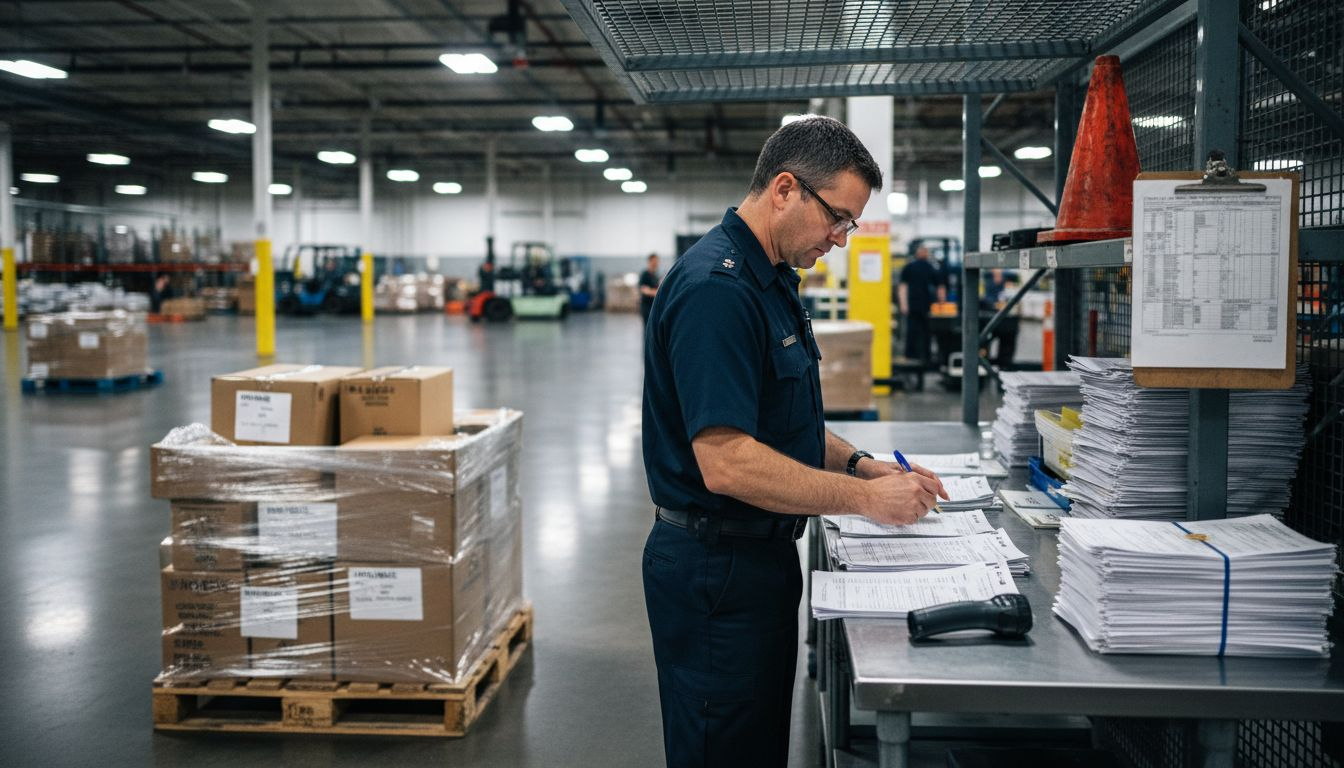Customs valuation sounds like a hidden detail in international trade, but its influence is massive and felt in every cross-border shipment. Over 90 percent of global trade in goods is impacted by customs valuation standards, shaping how much companies pay and how products move worldwide. Most people assume these rules only matter to policymakers, yet even a small valuation mistake can cost companies millions or stop imports completely.
Table of Contents
- Defining Customs Valuation And Its Purpose
- The Importance Of Customs Valuation In International Trade
- How Customs Valuation Works: Principles And Methods
- Key Concepts And Terms In Customs Valuation
- Impact Of Customs Valuation On Businesses And Trade Compliance
Quick Summary
| Takeaway | Explanation |
|---|---|
| Customs valuation is essential for trade compliance. | Proper customs valuation ensures businesses adhere to laws and avoid penalties during cross-border transactions. |
| Accurate valuation affects overall import costs. | The customs value directly determines the duties and taxes due, influencing pricing and profit margins. |
| Understand different valuation methods. | Knowing methods like transaction value and alternative approaches can help in accurately assessing goods for import. |
| Maintain detailed documentation for imports. | Comprehensive records support accurate customs valuation and help prevent discrepancies and audits. |
| Noncompliance can lead to significant penalties. | Failure to correctly value goods can result in legal issues, financial fines, and damage to business reputation. |
Defining Customs Valuation and its Purpose
Customs valuation represents a critical process in international trade that determines the monetary value of imported goods for taxation and regulatory purposes. Understanding the fundamentals of customs valuation helps businesses navigate the complex landscape of cross-border commerce.
The Core Definition
At its essence, customs valuation is the method used by government authorities to assess the value of goods entering a country. This process is fundamental to calculating import duties, taxes, and trade statistics. The primary objective is to establish a fair and transparent mechanism for determining the financial worth of imported merchandise.
Key components of customs valuation typically include:
- The actual transaction value of goods
- Costs of transportation and insurance
- Additional fees and charges related to the import
- Adjustments for specific trade conditions
Importance in Global Trade
Customs valuation serves multiple critical functions in international trade regulation. By providing a standardized approach to assessing import values, it ensures that countries can:
- Protect domestic industries from unfair competition
- Generate accurate revenue through precise duty calculations
- Maintain transparency in cross-border commercial transactions
- Prevent potential fraud or undervaluation of imported goods
Businesses engaged in international trade must understand these principles to ensure compliance and avoid potential penalties. Our guide on customs import brokerage can provide additional insights into navigating these complex regulatory requirements.
The process is not merely a bureaucratic exercise but a sophisticated system designed to maintain fairness and integrity in global commerce. Accurate customs valuation helps governments collect appropriate revenues while supporting international trade agreements and economic relationships between nations.
The Importance of Customs Valuation in International Trade
Customs valuation plays a pivotal role in facilitating global commerce, serving as a critical mechanism for governments and businesses to manage cross-border trade effectively. Understanding international shipping costs becomes significantly easier when businesses comprehend the intricacies of customs valuation.
Economic and Regulatory Significance
The primary importance of customs valuation extends far beyond simple price determination. Governments rely on this process to generate revenue, implement trade policies, and protect domestic economic interests. By establishing a standardized method for assessing imported goods, countries can ensure fair competition, prevent undervaluation, and maintain transparent trade relationships.
Key economic functions of customs valuation include:
- Calculating accurate import duties and taxes
- Monitoring trade volumes and patterns
- Supporting national economic planning
- Preventing potential trade fraud
Strategic Trade Management
For businesses engaged in international trade, customs valuation represents more than a regulatory requirement. According to research from the World Trade Organization, it is a strategic tool that directly impacts financial planning and market competitiveness.
Companies must consider multiple factors during customs valuation, such as:
- Transaction value of goods
- Shipping and insurance costs
- Applicable international trade agreements
- Potential duty exemptions or preferential rates
Mastering customs valuation enables businesses to optimize their import strategies, manage costs effectively, and navigate complex international trade regulations with confidence. By understanding these principles, organizations can minimize financial risks and maximize their global trade potential.
How Customs Valuation Works: Principles and Methods
Customs valuation involves a systematic approach to determining the financial value of imported goods, utilizing multiple sophisticated methods recognized internationally. Learn more about working with a customs broker near you to navigate these complex valuation processes effectively.
Primary Valuation Methods
Transaction Value Method serves as the fundamental approach in customs valuation. This method primarily uses the actual price paid or payable for imported goods when they are sold for export. Governments prefer this method because it reflects the genuine commercial value of merchandise and provides the most direct assessment of worth.
Key considerations in transaction value calculation include:
- The total price of goods
- Costs of transportation and insurance
- Any commissions or brokerage fees
- Assist values (contributions made by the buyer that impact the product’s value)
Alternative Valuation Approaches
When transaction value cannot be determined, customs authorities employ alternative methods. According to research from the U.S. Customs and Border Protection, these alternative methods include:
- Identical Goods Method: Valuing goods using prices of identical merchandise previously imported
- Similar Goods Method: Using prices of comparable products with similar characteristics
- Deductive Value Method: Calculating value based on the selling price in the importing country
- Computed Value Method: Determining value through production costs, overhead, and profit margins
These alternative methods ensure a comprehensive and fair assessment when standard transaction value proves challenging to establish.
Below is a table summarizing the main customs valuation methods used by authorities, including their core basis and typical use scenarios.
| Valuation Method | Core Basis | Typical Use Scenario |
|---|---|---|
| Transaction Value Method | Actual price paid or payable for imported goods | Used when a clear, documented transaction has occurred |
| Identical Goods Method | Value based on price of identical imported merchandise | Applied when transaction value can’t be determined |
| Similar Goods Method | Price of similar goods with comparable characteristics | Used when identical goods pricing is unavailable |
| Deductive Value Method | Based on selling price in the importing country | Used if above methods are not applicable |
| Computed Value Method | Calculated from production cost, overhead, and profit | Applied when other methods cannot be used |
By providing multiple evaluation frameworks, customs authorities can maintain accuracy and prevent potential undervaluation or fraudulent pricing strategies in international trade.

Key Concepts and Terms in Customs Valuation
Customs valuation encompasses a complex array of technical terminology and specialized concepts that are crucial for businesses engaged in international trade. Discover more about customs brokerage services to better comprehend these intricate processes.
Fundamental Valuation Terminology
Customs Value represents the total monetary worth of imported goods used to calculate applicable duties and taxes. This comprehensive assessment goes beyond the simple purchase price, incorporating multiple financial elements that contribute to the product’s overall value.
Key fundamental terms include:
- Transaction Value: The actual price paid or payable for goods when sold for export
- Dutiable Value: The assessed value on which import duties are calculated
- Free On Board (FOB): The price of goods at the point of origin, excluding transportation costs
- Cost, Insurance, and Freight (CIF): Total cost including merchandise, insurance, and shipping expenses
Advanced Valuation Concepts
According to research from the World Trade Organization, several advanced concepts are critical in determining precise customs valuations:
- Assist Value: Additional contributions made by the buyer that impact the product’s total value
- Computed Value: Valuation method based on production costs, overhead, and profit margins
- Identical Goods Method: Pricing determined by comparing with previously imported identical merchandise
- Royalty Payments: Additional fees that might influence the total customs value
Understanding these nuanced terms enables businesses to navigate complex international trade regulations more effectively, ensuring accurate reporting and minimizing potential financial risks associated with customs declarations.
The following table provides concise definitions for key terms found throughout the article, helping readers quickly understand important customs valuation concepts.
| Term | Definition |
|---|---|
| Customs Value | Total monetary worth of imported goods for duties and taxes calculation |
| Transaction Value | Actual price paid or payable for goods sold for export |
| Dutiable Value | The assessed value upon which import duties are calculated |
| Free On Board (FOB) | Price of goods at origin, excluding transportation costs |
| Cost, Insurance, and Freight (CIF) | Total cost including merchandise, insurance, and shipping expenses |
| Assist Value | Additional contributions by buyer affecting product’s total value |
| Computed Value | Value based on production costs, overhead, and profit margins |
| Identical Goods Method | Method using previously imported identical merchandise for valuation |
Impact of Customs Valuation on Businesses and Trade Compliance
Customs valuation significantly influences business operations, financial planning, and regulatory adherence in international trade. Learn more about import export basics to comprehend these complex interactions.
Financial and Regulatory Implications
Accurate customs valuation directly impacts a company’s bottom line by determining import duties, taxes, and overall transaction costs. Businesses must meticulously document and verify the value of imported goods to ensure compliance and avoid potential financial penalties.
Key financial considerations include:
- Precise duty calculations affecting product pricing
- Potential additional costs from valuation discrepancies
- Risk of customs audits and potential fines
- Impact on overall supply chain economics
Compliance and Risk Management
According to research from the U.S. Department of Commerce, businesses face significant challenges in maintaining trade compliance through proper customs valuation. Noncompliance can result in severe consequences, including:
- Substantial financial penalties
- Potential legal investigations
- Temporary or permanent import restrictions
- Damage to business reputation and future trading opportunities
Companies must develop robust internal processes to accurately assess and report the value of imported goods. This involves comprehensive documentation, understanding of international trade regulations, and proactive risk management strategies. By implementing thorough valuation practices, businesses can minimize financial risks, ensure regulatory compliance, and maintain smooth international trade operations.

Unlock Smooth Customs Valuation and Hassle-Free Trade With Worldwide Express
Navigating customs valuation can feel overwhelming when accuracy and compliance are critical for your business success. If calculating transaction values, handling documentation, or managing complex regulatory changes is causing you stress, you are not alone. Many businesses grapple with financial uncertainty and risk penalties when dealing with customs valuation requirements. That is why the expertise highlighted throughout this article connects directly to the solutions we offer at Worldwide Express, Inc. Our team not only understands key terms like transaction value and assist value but also knows how to make these concepts work in your favor for every cross-border shipment. For more insights, explore our Uncategorized services category for tailored approaches that support your unique needs.

Empower your business by choosing a logistics partner who turns customs compliance into a competitive advantage. Visit Worldwide Express, Inc. to see how our hands-on customs brokerage, real-time tracking tools, and global freight expertise can keep you moving forward. Reach out now and take the first step towards worry-free international trade and reliable customs clearance.
Frequently Asked Questions
What is customs valuation?
Customs valuation is the process used by government authorities to determine the monetary value of imported goods for taxation and regulatory purposes. This process is crucial for calculating import duties, taxes, and maintaining fair trade practices.
Why is customs valuation important in international trade?
Customs valuation is essential because it ensures accurate revenue collection for governments, protects domestic industries from unfair competition, and prevents fraud in trade practices. It also aids in maintaining transparency in cross-border transactions.
What are the primary methods of customs valuation?
The primary method of customs valuation is the Transaction Value Method, which uses the actual price paid for imported goods. If this is not applicable, alternative methods include Identical Goods Method, Similar Goods Method, Deductive Value Method, and Computed Value Method.
What factors influence customs valuation?
Customs valuation is influenced by several factors, including the transaction value of goods, costs of transportation and insurance, applicable international trade agreements, and any adjustments for specific trade conditions.
Recommended
- Understanding International Shipping Costs: Key Insights – Worldwide Express, Inc.
- Understanding Customs Broker Near Me: What You Need to Know – Worldwide Express, Inc.
- Understanding the Role of a Customs Import Broker – Worldwide Express, Inc.
- Understanding Import Export Basics for Global Trade – Worldwide Express, Inc.






